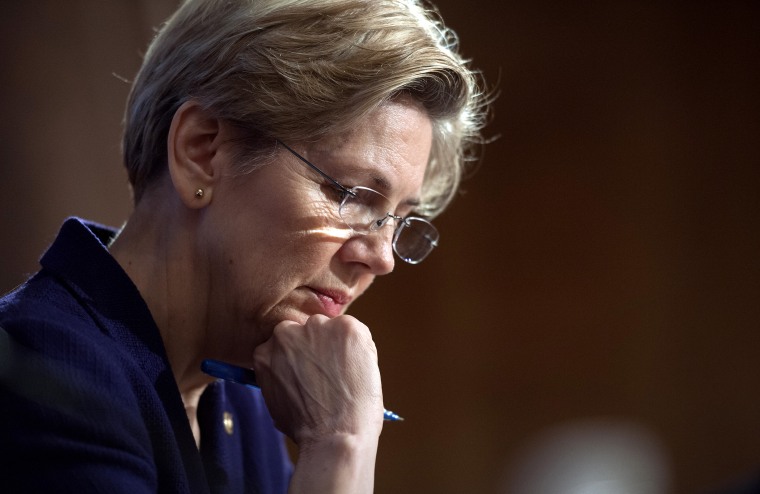The sweeping financial reform law known as Dodd-Frank may have been an important step in the right direction, but it didn't go nearly far enough, according to a comprehensive report on financial reform being promoted by Massachusetts Senator Elizabeth Warren.
"We still have a financial system that's very vulnerable to collapse, and the next collapse may very well be far worse than the last crisis," Center for American Progress senior fellow and former congressman Brad Miller, one of the report's contributors, told msnbc.
The 125-page paper, called "An Unfinished Mission: Making Wall Street Work For Us," was unveiled Tuesday morning ahead of an event, keynoted by Senator Warren, where most of the authors presented their arguments and discussed the future of financial reform. Warren, a progressive favorite in the Senate, has been a strident advocate of curtailing Wall Street's power.
In her speech at the event, Warren argued that the problem of "too big to fail" banks had only gotten worse.
"Today, the four biggest banks are 30% larger than they were five years ago. And the five largest banks now hold more than half of the total banking assets in the country," she said.
"I think that there is a great sense of frustration and a sense of injustice that the laws have not been enforced in the way most Americans think they should have been," said Miller, who wrote the report's chapter on regulatory enforcement. He notes that 79% of Americans "think more bankers and other financial executives should have been criminally prosecuted for their role in the financial crisis."
"An Unfinished Mission" is unlikely to persuade them otherwise. While the authors credit Dodd-Frank with reining in the mortgage market and creating valuable new regulatory tools, they also describe the law as a band-aid on a much larger problem.
"I don't think Dodd-Frank has succeeded in changing the financial situation over the long run so it better serves the real economy, and so it's less vulnerable to the kind of buildup that led to the crisis," said Stanley. The challenges that remain include a colossal, unaccountable shadow banking system, which was the subject of Stanley's chapter in the report. By the time of the 2008 financial collapse, Stanley estimates, over 50% of all credit in the United States flowed through shadow banking institutions, which are difficult to track or regulate.
Another key challenge may simply be compelling regulators to crack down on bad actors in the financial sector, according to Miller.
"In fact, regulators rarely consciously betray the public interest, but their view of the public interest may be greatly influenced by the industries subject to their regulation," he writes. To make sure that regulators do their job, he recommends measures like finding them funding streams independent of congressional appropriations.
Because the Consumer Financial Protection Bureau is funded by the Federal Reserve instead of Congress, it is "insulated from some of the pressures that other regulatory agencies are subject to," he told msnbc. He also suggested that aggressive reformers, if elected to Congress, can "create pressure on agencies ... to enforce the damn laws."
In her speech to the Roosevelt Institute, Warren seemed to be trying to create some of that pressure. She excoriated regulators who she said had failed to write new rules for the financial industry, and suggested that Congress should step in where those regulators would not.
"If Dodd-Frank gives the regulators the tools to end 'too big to fail,' great; end 'too big to fail,'" she said. "But if the regulators won’t end 'too big to fail,' then Congress must act to protect our economy and prevent future crises."
